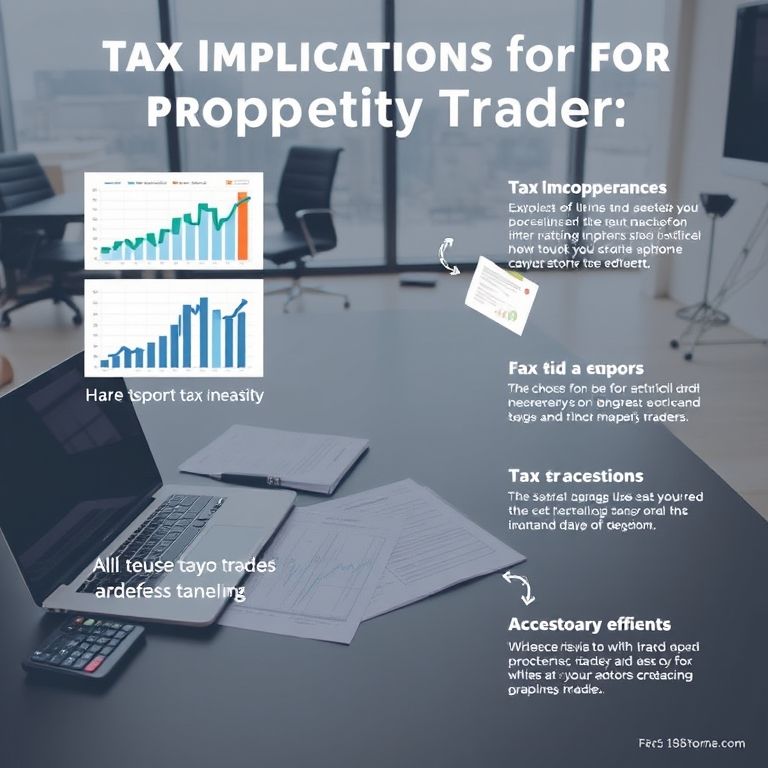Tax implications of working for a proprietary trading firm
Tax Implications of Working for a Proprietary Trading Firm: A Practical Guide
Introduction
Trading on a prop desk means you’re chasing the edge with the firm’s capital, fast orders, and a performance-driven culture. The money you earn is exciting, but taxes can quietly shape your take-home. This guide breaks down how compensation, asset mix, and growing tech trends—from crypto to AI—play into your tax picture across forex, stocks, crypto, indices, options, and commodities.

Understanding compensation and tax status
- How you’re paid changes withholding and reporting. If you’re on a W-2 with a prop shop, taxes are handled at the payroll level. If you’re 1099 or a contractor, you handle quarterly estimates and self-employment tax yourself.
- Trader tax status (TTS) and “business” versus “investor” classifications matter. A high-volume, purpose-driven trading setup often nudges toward a business-like posture, which affects deductions and filing. It’s not just what you earn, but how you structure your books that matters come April.
Key tax frameworks you may encounter
- Section 1256 contracts: regulated futures contracts and many FX futures get a 60/40 treatment, meaning 60% of gains are taxed at long-term rates and 40% at short-term rates, regardless of how long you held the position. It can tilt the tax math in a trader’s favor for short-term activity.
- Section 475(f) mark-to-market (MTM): some active traders elect MTM, treating gains and losses as ordinary income. This can simplify year-end accounting but shifts the tax rate perspective and requires strict compliance.
- Securities vs. crypto: gains on stocks, ETFs, and options usually follow standard capital gains rules (long- or short-term based on holding period). Crypto is property for tax purposes, so reporting follows capital gains/ordinary income logic, with specific rules for income like mining or staking.
Crypto and DeFi tax complexities
- Crypto is taxed as property. Capital gains apply when you sell, trade, or spend crypto. Holding periods still matter for long- vs short-term rates.
- DeFi and on-chain activity amplify record-keeping needs: cost basis across wallets and multiple exchanges, airdrops, staking rewards, liquidity mining, and hard forks all require careful documentation.
- Decentralized protocols bring innovation and risk. Tax reporting tools that track wallet-to-wallet moves help, but audits or inquiries may require you to reconstruct trades across chains.
Cross-asset tax landscape for prop traders
- Forex (FX): gains on certain FX contracts can fall under different sections (often treated as ordinary income under some rules) versus 1256-type treatments for futures. Structure and instrument type matter.
- Stocks and indices: standard capital gains; options on stocks split into short/long-term results. Short-term rates can sting if you hold quickly.
- Commodities and futures: many commodity futures fall under 1256, with the favorable 60/40 split; some contracts or ETF vehicles may follow different rules.
- Crypto: treated as property; every trade or sale is a taxable event. Maintain precise cost bases and track every conversion.
Practical strategies and reliable practices
- Keep meticulous records: trading activity, lots, cost bases, and receipts. Use software that supports multi-wallet crypto and various exchanges.
- Separate your trading from personal life: clean books simplify quarterly estimates and year-end filings.
- Consider tax-optimization tools and professional guidance: 1256 MTM or MTM-like strategies aren’t one-size-fits-all; talk to a CPA who knows prop trading, multi-asset tax rules, and crypto.
- Plan contributions and retirement possibilities: retirement accounts can offer tax advantages, but there are rules about self-directed and employer plans in a prop trading setup.
- Year-end planning: review gains/losses, carryovers, and the anticipated market mix for the next year to estimate quarterly payments accurately.
DeFi, regulation, and the challenges ahead
- DeFi growth brings opportunities but also regulatory and compliance questions. Tax reporting needs to keep pace with on-chain activity, audits, and evolving rules.
- Smart contracts and AI are reshaping execution and risk management. Expect more automated tax-ready reporting tools and transactional transparency, but stay aware of shifts in compliance expectations.
Future trends and prop trading outlook
- Smart contracts and AI-driven trading will push efficiency, speed, and risk controls. The tax angle isn’t just about reporting—it’s about designing compensation and structure that align with regulatory realities.
- Across forex, stock, crypto, indices, options, and commodities, prop trading stands to grow with smarter capital deployment and tighter risk checks. A well-planned tax approach becomes part of the competitive advantage.
Promotional takeaway
Prop trading with tax-aware thinking isn’t just about staying compliant—it’s a performance edge. Build a desk that earns, moves money efficiently, and files cleanly.
If you’re eyeing a prop trading path, partner with a tax pro who understands multi-asset trading, crypto, and the evolving DeFi landscape. A strong tax framework today helps your trading potential tomorrow.

